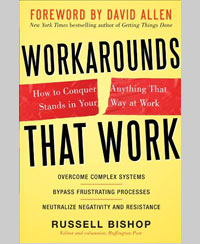Whining Ways
Janelle M. Barlow, coauthor (with Claus Møller) of A Complaint Is a Gift: Recovering Customer Loyalty When Things Go Wrong, introduces a lesson in the value of complaining co-workers from Workarounds That Work: How to Conquer Anything That Stands in Your Way at Work, by Russell Bishop.
Most managers associate complaints with customers, but complaints also come from colleagues, staff, and suppliers. Unfortunately, when co-workers and contractors complain, they are frequently seen as “whiners.” For some reason, we don’t view their complaints with the same concern we show to customer complaints.
But what if we saw our complaining colleagues as providers of information or perspectives that might be useful to us? Or as valuable assets, who, like unsatisfied customers, might leave us if we don’t listen? Perhaps then we would respond to their complaints with a bit more utility.
In the excerpt below, Russell Bishop suggests a series of questions that not only will help relieve the sting of a co-worker’s critique, but also can invite constructive thinking. If we can channel these complaints into productive discussions that enable us to improve quality or revamp processes, everybody benefits. Indeed, we may even come to see them as gifts.
— Janelle M. Barlow
Excerpted from Chapter 16 of Workarounds That Work: How to Conquer Anything That Stands in Your Way at Work
While many complainers are unique in their own ways, most tend to come in one of three varieties: the technical complainer (TC), the professional complainer (PC), and the generalist complainer (GC). TCs have the ability to notice essentially anything and everything that is out of spec. If there’s a fault, they can find it. TCs are good to have around if finding faults matters. For example, TCs can be quite helpful in your quality-inspection process. They may not be terribly good at fixing the faults, but at least they can zero in on them.
A close relative of the TC is the PC — the professional complainer. PCs tend to also notice faults, but at a level higher than mere technical faults. The PC will notice systemic issues, process issues, or larger organizational issues. PCs can also be useful, but they can be irritating at the same time. It seems that the PCs of the world attribute more value to their complaints than do those who have to hear them. Both the PC and TC offer valid criticisms, and the insightful manager or coworker can look past the whining nature of the complaint or the seemingly constant barrage of criticism and expose that validity.
The third category of complainer presents a different challenge. The GC, or generalist complainer, has no territorial limit; these ladies and gentlemen have built a core competency around complaint and criticism and can poke holes in darn near anything. They also tend to be pretty sharp, although their true brilliance may be masked by the near constant whining and their unparalleled skill in one-downmanship.
Negatives aside, even the GCs are trying to tell you something that could be useful. In order to complain, they usually must first perceive something that could be improved, most likely something that could be of some importance; they just aren’t engaged or secure enough to take action themselves. In fact, if you ask most complainers, regardless of type, they will tell you that by complaining, they think they are doing something. For them, complaining equates to action.
Next time you hear a complaint coming from someone, especially if it’s you, ask one or more of these questions:
- What would you prefer instead?
- Why would it matter?
- Who would benefit if this improved?
- What would it look like if this were different?
- What would it take to make this better?
Any of these or dozens of variants will work wonders. Keep in mind that the complaint is in essence a signal that the complainer can see something that could be improved. Sometimes complainers are actually right and just don’t know how to get the message across or, worse, don’t think anyone else cares. If they are right, and you ask them one of these questions, you can change the conversation from the typical bitch session to something productive. If you go down this inquiry route, you can follow up with questions that [create] control and influence:
- What could you do to help improve the situation all on your own?
- What could you do to help improve the situation with support, collaboration, or approval from someone else? Who?
- What do you need in order to help improve this situation?
- How can I help?
The key is to recognize that hidden inside the complaint, there may well be a nugget of value. You don’t need to waste time with those who just complain as an excuse to avoid taking action, but then you may want to know what’s in the way if, indeed, something is in the way. By asking a few of these kinds of questions, you can interrupt the pattern of complaining that saps productivity — your productivity, their productivity, and perhaps that of the whole organization. If you are sincere in the questions you ask, you may just discover something important and wind up encouraging employees to move from complaint to positive action. Embracing complaints may be a way to lessen the amount of them, uncover meaningful improvement opportunities, and turn marginal employees into productive ones.
Here are a couple of ways to break through resistance when people are complaining:
- Redirect their complaints into roles or tasks that take advantage of the complaint. Both the TC and PC can present interesting mini-workaround opportunities. Assuming that their faultfinding tends to be reasonably accurate, one way to turn the incessant criticism into something of value is to retrain the TC or PC for a role within your quality-inspection process. Hey, if they are good at finding faults, you may as well have them finding faults that matter!
- Engage them in the job of fixing the problem. Give them permission, authority, and sufficient air cover to encourage their active participation in stamping out the menace. Sometimes complainers would truly like to get involved, but they fear that they will be struck down or become the target of criticism themselves if their ideas don’t work perfectly the first time. Be sure to remove the fear of punishment if their ideas don’t work.
— Russell Bishop
Excerpted from Workarounds That Work: How to Conquer Anything That Stands in Your Way at Work, © 2011 by Russell Bishop. Reprinted by permission of The McGraw-Hill Companies.





